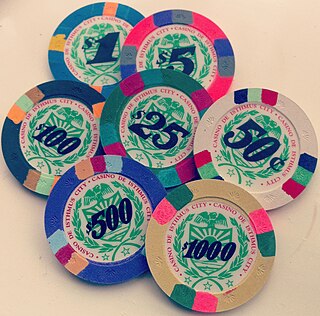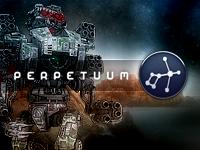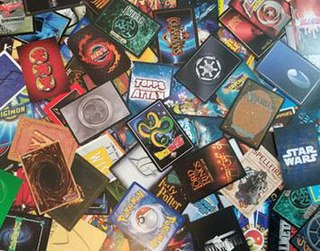
Rock–paper–scissors is a hand game usually played between two people, in which each player simultaneously forms one of three shapes with an outstretched hand. These shapes are "rock", "paper", and "scissors". "Scissors" is identical to the two-fingered V sign except that it is pointed horizontally instead of being held upright in the air. A simultaneous, zero-sum game, it has only two possible outcomes: a draw, or a win for one player and a loss for the other.

Casino tokens are small discs used in lieu of currency in casinos. Colored metal, injection-molded plastic or compression molded clay tokens of various denominations are used primarily in table games, as opposed to metal token coins, used primarily in slot machines. Casino tokens are also widely used as play money in casual or tournament games.
Guild Wars is a online role-playing game series developed by ArenaNet and published by NCSOFT. The games were critically well received and won many editor's choice awards, as well as awards such as Best Value, Best Massively Multiplayer Online Role-Playing Game (MMORPG), and Best Game. Guild Wars was noted for being the "first major MMO to adopt a business model not based on monthly subscription fees", its instanced approach to gameplay, and the quality of the graphics and play for computers with low specifications. In April 2009, NCSoft announced that 6 million units of games in the Guild Wars series had been sold. The sequel, Guild Wars 2, was announced in March 2007 and released on August 28 2012. It features updated graphics and gameplay mechanics, and continues the original Guild Wars tradition of no subscription fees. The Guild Wars series had sold 11.5 million copies by August 2015.

Alex Kidd in the Enchanted Castle is a side-scrolling platform game developed and published by Sega for the Sega Genesis video game console. The game was released in Japan in February 1989, in the U.S. in August 1989, and in Europe in November 1990. It is the only 16-bit platform game starring Alex Kidd, and the fifth game in the Alex Kidd series of video games.

The Wheel of Time: Collectible Card Game was a collectible card game based on Robert Jordan's The Wheel of Time fantasy series, published by Precedence Entertainment in December 1999. The Wheel of Time was somewhat unusual among contemporary CCG's, because the game required a play mat with tokens and customised six-sided dice to play it. It uses some similar game mechanics to the Babylon 5 Collectible Card Game and the Tomb Raider Collectible Card Game, which were also published by Precedence.

Mind's Eye Theatre is a live action role-playing game based on the White Wolf World of Darkness universe, sharing a theme and setting originally with the table-top role-playing game Vampire: The Masquerade and with two revisions, Vampire: The Requiem and Mind's Eye Theater: Vampire The Masquerade. Other games or "venues" include: Werewolf: The Forsaken, Mage: The Awakening, Changeling: The Lost and more.
In game theory, a player's strategy is any of the options which he or she chooses in a setting where the outcome depends not only on their own actions but on the actions of others. A player's strategy will determine the action which the player will take at any stage of the game.

Heavy Gear is a mecha science fiction game universe published since 1994 by Canadian publisher Dream Pod 9. It includes a tabletop tactical wargame, a role-playing game, and a combat card game. The setting is also known through the PC game incarnations published by Activision in 1997 and 1999, which were developed after Activision lost the rights to the Battletech/MechWarrior series. It also spawned a 40-episode, 3D-animated TV series in 2001, which featured a much simplified version of the universe developed in the role-playing game.

Armored Core 4 is a vehicular combat mecha-based video game developed by FromSoftware for the PlayStation 3 and Xbox 360 consoles. It is the 12th installment of the Armored Core series, and was a reboot of the series after Armored Core 3. The game is set in the future where a great war has left the nations of Earth devastated and their respective governments taken over by corporations. The game features a system for personalized customization of the player's mech and an online mode where players can battle each other.
Duels was a free player vs. player browser game. A player's avatar could either fight another player controlled avatar, or an NPC to gain experience points, gold, and tokens. Tokens were used to purchase packs containing scrolls, armor, and weapons. Gold was used to purchase armor, weapons, pets, and, in Duels 2.0, actions. Players were given the option to issue challenges to each other. When a player accepted a challenge, the avatars fought it out in real time, but without player interaction. As such, players did not need to be logged in to engage in battle. Duels offered paid memberships called Nobles or Patrons with many useful perk choices, and non-member players could purchase Challenge Coins which gave access to some of these more advanced menu choices for playing, but the game was not pay to play.

Grudge Warriors is a car combat video game released by Take-Two Interactive on April 27, 2000. The game retailed for the low price of $9.99, a response by Take-Two to the recent decision of Sony to drop PlayStation licensing fees. Similar to the earlier PlayStation title Twisted Metal, players control a powerful tank-like armored vehicle, which they used to destroy enemy vehicles, weapons, and generators, solve puzzles, and collect tokens to upgrade their weapons. There are a total of twenty-three missions, and the game allows two players to battle each other in split screen multiplayer.

Simultaneous action selection, or SAS, is a game mechanic that occurs when players of a game take action at the same time. Examples of games that use this type of movement include rock–paper–scissors and Diplomacy. Typically, a "secret yet binding" method of committing to one's move is necessary, so that as players' moves are revealed and implemented, others do not change their moves in light of the new information. Thus, in Diplomacy, players write down their moves and then reveal them simultaneously. Because no player gets the first move, this potentially arbitrary source of advantage is not present. It is also possible for simultaneous movement games to proceed relatively quickly, because players are acting at the same time, rather than waiting for their turn. Simultaneous action selection is easily implemented in card games such as Apples to Apples in which players simply select cards and throw them face-down into the center.

Perpetuum is a video game by Avatar Creations Ltd. It is a player-driven persistent-world MMORPG set in a science fiction ground setting. Players pilot customisable robots on various islands connected by several teleports. These islands are either alpha or beta/gamma, meaning players can freely engage each other.

The Technomancer is an action role-playing video game, developed by Spiders and published by Focus Home Interactive. The game is set within the same universe as Spiders' previously developed game, Mars: War Logs. Olivier Deriviere scored The Technomancer.
Dirty Bomb, formerly known as Extraction, is a free to play first-person shooter multiplayer video game set in London after a radiological attack. It was developed by Splash Damage and initially published by Nexon America for Microsoft Windows, and open beta version was released in June 2015. As of February 2017, Warchest, an in-house publishing arm of Splash Damage has taken over from Nexon America as the publisher for the game. The trailer was released at the 2015 Electronic Entertainment Expo. Dirty Bomb was Splash Damage's first intellectual property.
The Genius: Rules of the Game is the first season of The Genius debuted on tvN on April 26, 2013.

Austin Powers: Oh, Behave! is an action video game developed by Tarantula Studios and published by Rockstar Games for Game Boy Color on 18 September 2000 in North America, and on 3 November 2000 in Europe.















